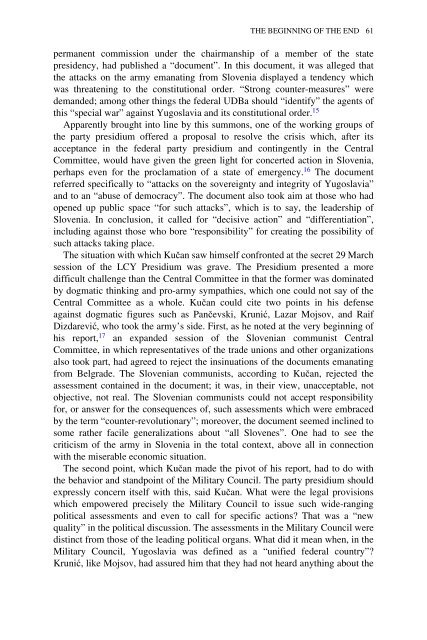Yugoslavia: A History of its Demise - Indymedia
Yugoslavia: A History of its Demise - Indymedia
Yugoslavia: A History of its Demise - Indymedia
Create successful ePaper yourself
Turn your PDF publications into a flip-book with our unique Google optimized e-Paper software.
THE BEGINNING OF THE END 61<br />
permanent commission under the chairmanship <strong>of</strong> a member <strong>of</strong> the state<br />
presidency, had published a “document”. In this document, it was alleged that<br />
the attacks on the army emanating from Slovenia displayed a tendency which<br />
was threatening to the constitutional order. “Strong counter-measures” were<br />
demanded; among other things the federal UDBa should “identify” the agents <strong>of</strong><br />
this “special war” against <strong>Yugoslavia</strong> and <strong>its</strong> constitutional order. 15<br />
Apparently brought into line by this summons, one <strong>of</strong> the working groups <strong>of</strong><br />
the party presidium <strong>of</strong>fered a proposal to resolve the crisis which, after <strong>its</strong><br />
acceptance in the federal party presidium and contingently in the Central<br />
Committee, would have given the green light for concerted action in Slovenia,<br />
perhaps even for the proclamation <strong>of</strong> a state <strong>of</strong> emergency. 16 The document<br />
referred specifically to “attacks on the sovereignty and integrity <strong>of</strong> <strong>Yugoslavia</strong>”<br />
and to an “abuse <strong>of</strong> democracy”. The document also took aim at those who had<br />
opened up public space “for such attacks”, which is to say, the leadership <strong>of</strong><br />
Slovenia. In conclusion, it called for “decisive action” and “differentiation”,<br />
including against those who bore “responsibility” for creating the possibility <strong>of</strong><br />
such attacks taking place.<br />
The situation with which Kučan saw himself confronted at the secret 29 March<br />
session <strong>of</strong> the LCY Presidium was grave. The Presidium presented a more<br />
difficult challenge than the Central Committee in that the former was dominated<br />
by dogmatic thinking and pro-army sympathies, which one could not say <strong>of</strong> the<br />
Central Committee as a whole. Kučan could cite two points in his defense<br />
against dogmatic figures such as Pančevski, Krunić, Lazar Mojsov, and Raif<br />
Dizdarević, who took the army’s side. First, as he noted at the very beginning <strong>of</strong><br />
his report, 17 an expanded session <strong>of</strong> the Slovenian communist Central<br />
Committee, in which representatives <strong>of</strong> the trade unions and other organizations<br />
also took part, had agreed to reject the insinuations <strong>of</strong> the documents emanating<br />
from Belgrade. The Slovenian communists, according to Kučan, rejected the<br />
assessment contained in the document; it was, in their view, unacceptable, not<br />
objective, not real. The Slovenian communists could not accept responsibility<br />
for, or answer for the consequences <strong>of</strong>, such assessments which were embraced<br />
by the term “counter-revolutionary”; moreover, the document seemed inclined to<br />
some rather facile generalizations about “all Slovenes”. One had to see the<br />
criticism <strong>of</strong> the army in Slovenia in the total context, above all in connection<br />
with the miserable economic situation.<br />
The second point, which Kučan made the pivot <strong>of</strong> his report, had to do with<br />
the behavior and standpoint <strong>of</strong> the Military Council. The party presidium should<br />
expressly concern <strong>its</strong>elf with this, said Kučan. What were the legal provisions<br />
which empowered precisely the Military Council to issue such wide-ranging<br />
political assessments and even to call for specific actions That was a “new<br />
quality” in the political discussion. The assessments in the Military Council were<br />
distinct from those <strong>of</strong> the leading political organs. What did it mean when, in the<br />
Military Council, <strong>Yugoslavia</strong> was defined as a “unified federal country”<br />
Krunić, like Mojsov, had assured him that they had not heard anything about the
















